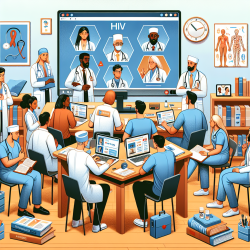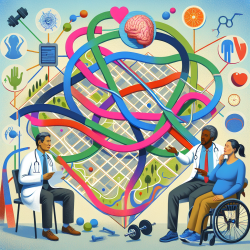Introduction
In the ever-evolving field of healthcare, the demand for skilled professionals is continuously increasing, particularly in specialized areas such as HIV care. The Southeast AIDS Education and Training Center (SE AETC) has developed an innovative approach to address this need through Interprofessional Education (IPE). This blog explores how practitioners can enhance their skills by implementing the outcomes of the SE AETC's IPE program and encourages further research in this area.
The Importance of Interprofessional Education
Interprofessional Education is a collaborative approach that brings together students from various health disciplines to learn about, from, and with each other. This method is particularly effective in preparing healthcare professionals to provide comprehensive care for people with HIV (PWH). The SE AETC's IPE program, in collaboration with institutions like the University of Florida and Vanderbilt University Medical Center, aims to cultivate a workforce ready to tackle the challenges of HIV care.
Key Outcomes of the IPE Program
The SE AETC's IPE program has shown significant success in increasing the comfort and ability of students to provide HIV-related services. According to the research, students reported a marked improvement in their comfort level and ability to perform professional care for PWH after participating in the program. This was measured through standardized surveys conducted at various stages of the program.
Practical Applications for Practitioners
Practitioners can benefit from the IPE program's outcomes by integrating similar collaborative practices into their professional development. Here are some practical steps:
- Engage in multidisciplinary training sessions that include medicine, nursing, pharmacy, and social work.
- Participate in collaborative activities and case studies to enhance problem-solving skills in a team setting.
- Focus on developing a person-first care approach, which is crucial in managing chronic conditions like HIV.
Encouraging Further Research
While the SE AETC's IPE program has demonstrated positive outcomes, there is a need for further research to explore its long-term impact on the HIV workforce. Practitioners are encouraged to delve deeper into the subject by reviewing the original research paper and considering how similar programs could be implemented in other areas of healthcare.
Conclusion
Interprofessional Education offers a promising avenue for enhancing the skills of healthcare practitioners, particularly in specialized fields like HIV care. By adopting collaborative practices and engaging in continuous learning, practitioners can contribute significantly to addressing workforce shortages and improving patient outcomes.
To read the original research paper, please follow this link: Interprofessional Education: An Innovative Approach to Increase the Human Immunodeficiency Virus Workforce.










